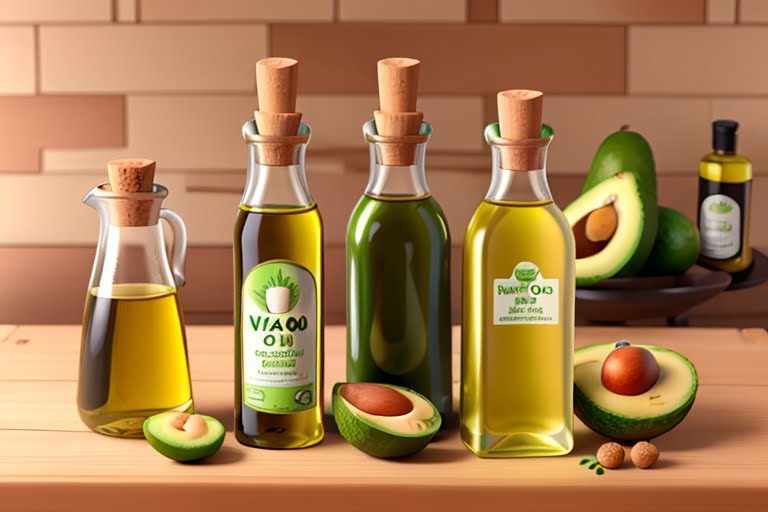The argument between avocado oil vs olive oil is one of the most heated and controversial in the world of food. Many kitchens now regularly use both due to their taste, flexibility, and health benefits. But it’s not always easy to decide which of the two to choose. Let’s examine the characteristics, applications, and health benefits of avocado and olive oils to resolve the debate.
Avocado Oil: The Rising Star

Avocado oil, derived from the fruit of the avocado tree, has become very popular in recent years, and for good reason. It has a mild, slightly nutty taste that makes it useful for both cooking and finishing food. Avocado oil’s high smoke point, typically ranging from 375°F to 400°F, enables its use in high-temperature cooking processes such as frying and sautéing without generating harmful compounds.
Avocado oil is full of monounsaturated fats, especially oleic acid, which is good for your health in many ways, like lowering inflammation and making your heart healthier. Furthermore, it contains antioxidants, such as vitamin E, which fight environmental stress and keep skin healthy.
In the kitchen, avocado oil’s neutral taste makes it a great choice for mayonnaise, salad dressings, and marinades. The creamy texture gives these foods a fancy look. Because it has a high smoke point, it’s also great for grilling and roasting meats, seafood, and veggies. It adds richness to food without overpowering other tastes.
Olive Oil: The All-Time Classic

For hundreds of years, olive oil has been an important part of Mediterranean cooking. People adore it for its robust flavor and numerous health advantages. The fruit of the olive tree yields olive oil. There are different grades of olive oil, and each has its own taste and use in cooking.
The best olive oil, extra virgin, is cold-pressed without using heat or chemicals. This maintains the oil’s natural taste and nutrients. It tastes fruity and a little spicy, which makes it great for pouring over salads, dipping bread in, or adding the finishing touch to pasta recipes. Because its smoke point ranges from 320°F to 375°F, you can use extra virgin olive oil for light sautéing and cooking over low to medium heat.
Often labeled as “pure” or “light,” regular olive oil undergoes additional processing to achieve a milder taste and a higher smoke point (up to 465°F). Even though it doesn’t have as many complex flavors as extra virgin olive oil, regular olive oil is a cheap way to cook that adds a fruity flavor to food without overpowering other flavors.
When it comes to nutrition, olive oil is famous for having a lot of monounsaturated fats, polyphenols, and other vitamins that help fight inflammation and protect the heart. Heart disease, stroke, and certain types of cancer are less likely to happen in people who eat it. This makes it an important part of a healthy diet.
Some comparison between Avocado oil and Olive oil

Avocado Oil vs Olive Oil Health Benefits
Due to their rich nutrient profiles, avocado oil and olive oil are both renowned for their impressive array of health benefits. Let’s look at the different health benefits that each one offers:
Health Advantages of Avocado Oil
1. Heart Health: Research links mono-unsaturated fats, particularly oleic acid, found in large amounts in avocado oil, to improved heart health. Cutting down on LDL (bad) cholesterol and raising HDL (good) cholesterol levels with these healthy foods lowers the risk of heart disease.
2. Properties that reduce inflammation: Avocado oil contains antioxidants like vitamin E and carotenoids, which help fight inflammation in the body. Chronic inflammation links to many health problems such as heart disease, arthritis, and metabolic syndrome. Because it lowers inflammation, avocado oil may help make these diseases less likely to happen.
3. Healthy Skin: Avocado oil is good for your face because it contains a lot of vitamin E. Vitamin E contains a potent antioxidant that shields the skin from the damaging effects of free radicals, pollution, and UV light. Avocado oil’s moisturizing properties can also help keep the face hydrated and healthy, making you look your best.
4. Absorption of Nutrients: Avocado oil contains a significant amount of monounsaturated fats. These fats help your body absorb fat-soluble nutrients like vitamins A, D, E, and K. When you eat avocado oil with foods that are high in nutrients, such as salads or veggies, your body can better absorb these vitamins.
Health Advantages of Olive Oil
1. Heart and blood vessel health: Olive oil is known for being good for your heart because it has a lot of natural fats, especially oleic acid. Regular use of olive oil can lower LDL cholesterol, blood pressure, and inflammation, thereby reducing your risk of heart disease.
2. Effects of antioxidants: Extra virgin olive oil contains some very strong antioxidants like polyphenols and tocopherols. These help the body get rid of dangerous free radicals. These antioxidants help keep cells healthy and long-lasting by inhibiting oxidative damage.
3. Function of the Mind: Olive oil may be good for your brain because it has vitamins and monounsaturated fats. Studies show that a Mediterranean-style diet high in olive oil may lower the risk of cognitive decline and neurodegenerative diseases like Alzheimer’s that occur with age.
4. Health of the Digestive System: Olive oil is good for your gut health because it reduces inflammation and has a lot of monounsaturated fats. It can help reduce swelling in the digestive system, encourage regularity, and promote the growth of good bacteria in the gut.
Both avocado oil and olive oil are good for you in many ways, from improving heart health and lowering inflammation to improving skin health and brain function. Adding these healthy oils to your diet in small amounts can help your health and extend your life. Avocado oil and olive oil are tasty and useful additions to a healthy lifestyle. You can use them in cooking, drizzle them over salads, or use them as a dip for bread.
Avocado Oil vs Olive Oil Nutritional value:

Comparing the nutritional value of avocado oil and olive oil reveals key differences and similarities that make each oil unique. Here are some of the nutrients they contain:
Avocado Oil Nutrition:
1. Monounsaturated Fats: Monounsaturated fats, primarily oleic acid, comprise the majority of avocado oil. These healthy fats are good for your heart because they lower LDL (bad) cholesterol and raise HDL (good) cholesterol levels. This lowers the risk of heart disease.
2. Vitamin E: Avocado oil contains a significant amount of vitamin E. Vitamin E is a strong antioxidant that helps keep cells safe from free radical damage. Vitamin E is also good for your face because it protects against UV rays and helps make collagen.
3. Other Nutrients: Avocado oil has small amounts of other nutrients, such as vitamin K, folate, and potassium. These nutrients help blood clots, cells grow, and blood pressure stay normal, respectively.
4. Calories: Like all oils, avocado oil is high in calories. One tablespoon of avocado oil has about 120 calories. It gives you important nutrients, but you should only eat a small amount at a time to avoid getting too many calories.
Olive Oil Nutrition:
1. Monounsaturated Fats: Also, olive oil contains a lot of monounsaturated fats, mostly oleic acid, which makes up the majority of its fat content. These fats are good for your heart because they lower inflammation and raise HDL blood levels.
2. Antioxidants: Extra virgin olive oil, in particular, is abundant in antioxidants, including polyphenols and tocopherols, which have anti-inflammatory and protective effects against chronic diseases such as heart disease and cancer.
3. Vitamin E: Although it does not contain as much vitamin E as avocado oil, olive oil does. Even so, it still has antioxidant benefits and is good for your face.
4. Other Nutrients: Olive oil has small amounts of other nutrients, like vitamin K and iron, but the healthy fats and antioxidants in it are what make it nutritionally valuable.
5. Number of calories: Just like avocado oil, olive oil has a lot of calories—about 120 calories per tablespoon. It’s good for you in many ways, but it’s important to eat it in moderation to avoid getting too many calories.
Other comparison of avocado oil vs olive oil:

1. Flavor:
Avocado Oil: This oil has a mild, slightly nutty taste and a creamy texture that makes food taste better without affecting other ingredients.
Olive Oil: There are different types of olive oil. The best olive oil, extra virgin olive oil, tastes fruity and slightly peppery. Regular olive oil, on the other hand, has a milder flavor.
2. Smoke Point:
Avocado Oil: Due to its high smoke point, typically between 375°F and 400°F, this type of oil is suitable for high-heat cooking such as frying and sautéing.
Extra virgin olive oil: It has a lower smoke point, between 320°F and 375°F. You can use it for light sautéing and cooking over low to medium heat. Regular olive oil has a higher smoke point, reaching 465°F. This makes it better for cooking at higher temperatures.
3. Uses in cooking:
Avocado oil: It is great for cooking at high temperatures, like when you fry, roast, or grill food. You can also use avocado oil in salad dressings, marinades, and mayonnaise due to its neutral taste.
Olive oil: It is great for adding to salads, dipping bread in, and finishing off meals to make them taste better. It can also be used to sauté, braise, and stew food, particularly in Mediterranean cuisine.
4. Price:
Avocado oil: It is usually more expensive than olive oil because extracting it from avocados requires a lot of work.
Olive oil: It comes in a lot of different grades and quality levels, with extra virgin olive oil being the most expensive for the most part.
5. Long-term support:
Avocado Oil: Growing avocados can have effects on the earth, such as cutting down trees and using a lot of water, especially in areas where avocados are grown.
Olive Oil: Compared to some other oil crops, olives require less water and have less of an impact on the environment.
Overall, avocado oil and olive oil have different tastes, uses in cooking, and health benefits. Their smoke point, flavor profile, and nutritional content make them perfect for various cooking situations and personal tastes. Playing around with both oils lets you learn about their unique traits and add them to a healthy, tasty diet.
Both avocado oil and olive oil are healthy additions to a well-balanced diet because they contain healthy fats, antioxidants, and other good nutrients. When you cook and prepare meals, using these oils can make them taste better, help your heart, and improve your general health.
How to choose between the two
If you have to choose between avocado oil and olive oil, it comes down to personal taste, cooking needs, and health concerns. Because it has a bland flavor and a higher smoke point, avocado oil is great for high-temperature cooking and recipes that need a mild taste. On the other hand, olive oil is great for drizzling, dipping, and making food taste better because it has a unique flavor and is high in antioxidants.
If you want to get the most health benefits from both oils, using them together in your cooking can give you a wide range of tastes and nutrients. People who cook at home can use the unique qualities of avocado oil and olive oil to make their meals taste better and healthier in new ways by trying out different recipes and cooking methods.
Whether you prefer the buttery richness of avocado oil or the robust complexity of olive oil, both are beneficial and versatile. You can easily navigate the avocado oil vs. olive oil debate by knowing their unique qualities and how to use them in cooking. This will improve your food and benefit your health at the same time.
FAQs
1. Is avocado oil a seed oil?

However, avocado oil is not really a seed oil. As the name says, seed oils come from plant seeds. Meanwhile, avocado oil comes from the fruit’s juice. Due to its origin and method of extraction, it is not the same as seed oils like canola, sunflower, or soybean oil.
2. Can dogs have avocado oil?

Dogs can eat avocado oil in small amounts. There are healthy fats and antioxidants in avocado oil that are good for a dog’s skin and body. Fewer molecules of persin are found in the oil than in other parts of the avocado. This chemical is generally safe for dogs. Due to its high fat content, it should not be given to the dog too often to avoid stomach issues or weight gain. You should also watch out for any bad effects and talk to your vet before adding avocado to your dog’s food because some dogs may be allergic or sensitive to it.
3. Can you fry with avocado oil?

Without a doubt, you can fry with avocado oil. Avo oil has a high smoke point, usually around 520°F (271°C). Because of this, it’s a great choice for frying and other high-heat cooking. It stays steady at high temperatures because it has a high smoke point. This makes it less likely that dangerous compounds will form. Avocado oil has a mild taste that doesn’t change the taste of the food being cooked. It can be used for many different types of cooking because of this.
4. How to make avocado oil?

To make avocado oil at home, you need to find avocados that are ready to be used. After that, cut them in half, remove the pits, and take out the meat. You can mix or process the avocado meat into a smooth paste. Put the paste in a pot. If you stir it every so often, heat it over low to medium heat for 30 to 60 minutes, or until the oil starts to separate. Pour the mixture into a bowl through a fine mesh strainer or cheesecloth after it has cooled a bit. This will get the oil out of the mixture. Gather the oil and put it in a clean jar that won’t let air in. Keep it in a cool, dark place.
5. can you use avocado oil instead of vegetable oil?

You can use avocado oil instead of vegetable oil in most recipes. This oil can be used to fry, sauté, and bake because it has a high smoke point. Like vegetable oil, it has a mild taste that won’t change how your food tastes. This oil is even better for you because it has a lot of good monounsaturated fats. Be aware that avocado oil might cost more than veggie oil, so you might want to save it for meals that really need it.






It is perfect time to make a few plans for the long run and it is time too be happy.
I’ve learn this publish and if I may I desire to counsel you few attention-grabbing things or advice.
Maybe you can write next articcles referring to this article.
I wish to learn more thjings approximately it! https://odessaforum.biz.ua/
Ok, Thanks a lot.
Truly when someone doesn’t know then its uup to other people that they will help, so here it happens. https://disqus.com/by/butivene/about/
Thanks.
Do you have a spam problem on this blog; I also am
a blogger, and I was curious about your situation;
many of uus have developed some nice practices and
wee are looking too exchange methods with other
folks, please shoot me ann emjail if interested. https://www.credly.com/users/paul-roher/badges
Hey would you mind sharing which blog platform you’re using?
I’m looking to start my own blog soon but I’m having a hard time choosing between BlogEngine/Wordpress/B2evolution and Drupal.
The reason I ask is because your design and style seems different then most blogs and I’m looking
for something unique. P.S Sorry for being off-topic butt I had
to ask! https://chart-studio.plotly.com/~aviatorgame
I am using WordPress and Elementor page builder. I am also a web developer so that I’m created this website by myself. If you need any help about website design related? then you can contact with me. Mail me at- abuhumaid806@gmail.com
I’m really loving thee theme/design of your weblog.
Do you ever run info any internet browser compatibility issues?
A number of my blog readers have complained about my site not working correctly
in Explorer butt looks great in Opera. Do
you have any advice to help fix this problem? https://groups.google.com/g/aviator-game
Explorer is a very classic browser so you can request to use other browser of your user or have to do responsive for explorer by the web developer. I hope, you get the answer the question.
Thanks a bunch for sharing this with all people you actually understand whawt you are talking approximately!
Bookmarked. Pleease also visit my site =). We can have a hyperlink alternate contract among us https://hanson.net/users/aviatorgameapp
Ok, thanks.
Everyone loves whhat you guys are uup too. Such clever work and exposure!
Keep upp the good works guys I’ve included you gguys to my
personal blogroll. https://devfolio.co/@GeorgeCurtis
Thanks.
Whats up are usingg Wordepress for your blog platform?
I’m new to the blog world but I’m trying to get started and
create my own. Do you need any html coding experttise tto make
your owwn blog? Any help woild be really appreciated! https://cs.trains.com/members/matthewjones/default.aspx
Thanks for commenting. I’m also a web developer so that I can codding for myself.
It’s actually a nice and helpful piece of info. I am satisfied
that you shared thjis helpvul info with us. Please keep us informed like this.
Thank you for sharing. https://www.outdoorproject.com/users/aviator-game-1
Thanks for appreciation.
Way cool! Somee very valid points! I appreciate you penning this article
and the rest of the website is extremely good. https://sites.google.com/view/aviatoraposta?usp=sharing
Thanks a lot dear.
Amazing Content! If you need some details about about Cosmetics than have a look here QN9
Thanks dear.
Hi! Quick question that’s completely off topic. Do you know how to make your site mobile friendly?
My blog looks weird when viewing from my apple iphone.
I’m trying to find a theme or plugin that might be able to resolve
this problem. If you have any recommendations, please share.
Appreciate it! https://www.proko.com/@aviator1/activity
Do that site mobile responsive by the web developer. Thank you.
Good day! I could have sworn I’ve been to this web site before
but after going through a few of the posts I realized it’s new too me.
Anyways, I’m definitely delighted I came across it aand I’ll be bopokmarking it and checking back regularly! https://www.callupcontact.com/b/businessprofile/Crazy_Time_Evolution/9090562
Thanks a lot dear. Stay connected with me.
Hello There. I discovered your blog usiing msn. That is a really smartly written article.
I will be sure to bookmark it and return to learn extra of your useful info.
Thank you for the post. I will definitely comeback. https://www.flickr.com/groups/2878281@N25/discuss/72157721921467263/
Thanks a lot.
Thanks a lot and Stay connected with Us.
Hey, if you are looking for more resources, check out my website FQ6 as I cover topics about Cosmetics. By the way, you have impressive design and layout, plus interesting content, you deserve a high five!
High five!
Hello fantastic website! Doess running a blog
like this require a lot of work? I havve abssolutely no knowledge of codng however I was hoping to start my own blog
inn the near future. Anyways, if you have any recommendations
or techniques ffor neew blog owners please share. I undeestand
this is off subject however I simply wanted too ask.
Thanks! https://icelandgamblings.mystrikingly.com/
You absolutely know how to keep your readers interest with your witty thoughts on that topic. I was looking for additional resources, and I am glad I came across your site. Feel free to check my website FQ7 about Airport Transfer.
Thank you for your sharing. I am worried that I lack creative ideas. It is your article that makes me full of hope. Thank you. But, I have a question, can you help me?
With your post, your readers, particularly those beginners who are trying to explore this field won’t leave your page empty-handed. Here is mine at FQ5 I am sure you’ll gain some useful information about Thai-Massage too.
Thank you so much! I’m really glad to hear that the post is helpful, especially for beginners. My goal is to provide clear, valuable insights that everyone can take something away from, so your feedback means a lot!
Hi there just wanted to give you a brief heads up and let you know a few of the images aren’t loading properly. I’m not sure why but I think its a linking issue. I’ve tried it in two different web browsers and both show the same results.
Hi! Thanks so much for the heads up—we really appreciate it! 😊 It sounds like there might be an issue with the image links, and we’ll definitely look into it to make sure everything displays correctly. Thanks for letting us know you tried it in different browsers; that helps us troubleshoot! If you notice any other issues or have further feedback, please don’t hesitate to reach out. Thanks again!
I don’t think the title of your article matches the content lol. Just kidding, mainly because I had some doubts after reading the article.
Haha, I appreciate your sense of humor! 😄 I’m glad you read the article, and I totally understand if it raised some doubts. If you have any questions or need clarification, feel free to ask—I’d be happy to discuss it further!
Those are yours alright! . We at least need to get these people stealing images to start blogging! They probably just did a image search and grabbed them. They look good though!
Thanks for noticing! 😊 While it’s flattering that the images are appreciated, it’s always better when proper credit is given. Hopefully, it inspires them to create their own content or start blogging—it’s a fun and rewarding journey!
Haha, I appreciate the compliment! 😄 It would be great if more people started creating their own content. Hopefully, it inspires them to start blogging and contributing their own work. But I’m glad you like the images!
Can you be more specific about the content of your article? After reading it, I still have some doubts. Hope you can help me.
I don’t think the title of your article matches the content lol. Just kidding, mainly because I had some doubts after reading the article.
Can you be more specific about the content of your article? After reading it, I still have some doubts. Hope you can help me.
Thank you for reaching out! I’d be happy to clarify any points from the article. Could you let me know which specific parts you’re uncertain about? I’ll do my best to provide more details and help clear up any confusion!
I couldn’t resist commenting
Thank you for your sharing. I am worried that I lack creative ideas. It is your article that makes me full of hope. Thank you. But, I have a question, can you help me?
Magnificent beat ! I would like to apprentice while you amend your site, how could i subscribe for a blog website? The account helped me a acceptable deal. I had been tiny bit acquainted of this your broadcast offered bright clear idea
Thank you for the wonderful feedback! I’m so glad to hear that the content has been helpful to you. 😊
To subscribe to a blog, you can usually find a subscription or “Follow” button either in the sidebar, footer, or at the top of the website. It may allow you to receive updates whenever new content is posted. If there’s a newsletter option, you can subscribe by entering your email for regular updates.
If you need more detailed instructions on how to subscribe or follow, feel free to ask!
Thank you for the positive feedback! 😊 To subscribe to a blog, most websites will have a subscription option, usually found in the sidebar, footer, or as a pop-up on the page. You can enter your email address to receive updates whenever new posts are published.
If you need more specific instructions on how to subscribe, or if you’re referring to a specific blog platform, feel free to ask, and I’ll guide you through it!
Thank you for your kind words! 😊 To subscribe to a blog, many websites have a subscription option, usually found in the sidebar, footer, or as a pop-up when you visit the site. By subscribing, you’ll get updates whenever new posts are published.
If you’re referring to a specific blog platform, or if you need more detailed instructions on how to subscribe, feel free to let me know, and I’ll be happy to guide you through the process!
Thank you for your kind words! 😊 To subscribe to a blog, many websites offer a subscription option, typically found in the sidebar, footer, or through a pop-up when you visit the site. This will allow you to receive updates whenever new posts are published.
If you’re referring to a specific blog or platform and need more detailed instructions, feel free to let me know! I’d be happy to help guide you through the subscription process.
Sweet website , super design, really clean and utilize genial.
Thank you so much for your kind words! I’m thrilled that you like the design and the layout. It’s great to know the website resonates with you! If you have any suggestions or feedback, feel free to share—I’m always looking to improve. 😊
Thank you so much for your kind words! I’m thrilled to hear you like the website design and find it easy to navigate. Your feedback means a lot, and I’ll continue to do my best to provide a great user experience. 😊 Let me know if there’s anything else you’d like to see!
Thank you so much for your kind words! 😊 I’m really glad you like the website design and find it clean and easy to use. Your feedback means a lot, and I’ll continue striving to provide a great experience. If you have any suggestions or ideas, feel free to share!
Thank you so much for your kind words! 😊 I’m really glad to hear that you like the website’s design and find it clean and easy to use. Your feedback means a lot, and I’m excited to continue sharing more content with you. If you ever have any suggestions or thoughts, feel free to share!
F*ckin’ awesome issues here. I’m very satisfied to see your post. Thank you a lot and i am having a look ahead to contact you. Will you kindly drop me a e-mail?
Thank you for your enthusiastic comment! I’m really glad you enjoyed the post! 😊 While I’m unable to directly email you, feel free to continue reaching out through comments or messages here, and I’ll be happy to assist you. Looking forward to hearing from you again soon!
Thank you for your enthusiastic comment! I’m really glad you enjoyed the post. 😊 While I can’t email you directly, feel free to continue reaching out here—I’m always happy to chat and help out however I can! Looking forward to hearing from you again soon.
Thank you so much for the enthusiastic comment! I’m really glad you enjoyed the post. 😊 While I can’t send emails directly, feel free to reach out here anytime—I’m always happy to chat and help with anything you need. Looking forward to hearing from you again soon!
I’m glad you’re enjoying the content! 😊 Unfortunately, I’m not able to send emails directly, but feel free to reach out anytime here if you have any questions or need assistance. I’m always happy to help!
Thanks for providing a trustworthy and trustworthy source.
Nice i really enjoyed reading your blogs. Keep on posting. Thanks
In the modern age of technological advancement, the issues these matter most are the time and information.
Really enjoyed this blog. Want more.
I¦ve been exploring for a little bit for any high quality articles or weblog posts on this sort of house . Exploring in Yahoo I at last stumbled upon this web site. Reading this information So i am satisfied to exhibit that I have a very just right uncanny feeling I came upon just what I needed. I so much undoubtedly will make sure to do not disregard this site and provides it a look regularly.
Whether or not it’s a livable dwelling in a protected neighborhood, good food, a house filled with puppies, or a bevy of tech gadgets makes no distinction.
Introducing to you the most prestigious online entertainment address today. Visit now to experience now!
Enjoyed looking through this, very good stuff, regards.
Hi my friend! I want to say that this post is awesome, nice written and include approximately all important infos. I would like to look extra posts like this .
hey there and thank you for your info – I have certainly picked up something new from right here. I did however expertise some technical issues using this website, since I experienced to reload the site a lot of times previous to I could get it to load properly. I had been wondering if your web host is OK? Not that I’m complaining, but slow loading instances times will very frequently affect your placement in google and could damage your high-quality score if advertising and marketing with Adwords. Anyway I’m adding this RSS to my e-mail and could look out for much more of your respective exciting content. Ensure that you update this again very soon..
Thanks for letting me know, and I really appreciate your feedback! 😊 It’s frustrating when technical issues pop up, especially with slow load times. I’ll definitely keep that in mind to ensure a smoother experience for everyone visiting. As you mentioned, website speed can impact both user experience and SEO, so I’ll look into optimizing things further.
I’m glad you’re interested in the content, though! Adding the RSS feed is a great way to stay updated. I’ll make sure to keep sharing more exciting posts. Thanks again for your support, and feel free to reach out if you run into any other issues!
Really enjoyed reading this! Managing money wisely is crucial, and we’ve explored some advanced budgeting techniques at Woofi Finance. Might be useful to your readers!
Thank you so much for the kind words! 😊 And that’s awesome to hear about Woofi Finance. Advanced budgeting techniques are definitely helpful for anyone looking to take control of their finances. I’ll keep that in mind for future suggestions!
If you’d like, I can write a post or share more on those budgeting strategies, or even collaborate on some ideas that could benefit your readers too. Let me know what you think!
Thank you so much! I’m really glad you enjoyed it. 😊 Advanced budgeting techniques at Woofi Finance sound like a great resource! I’m sure those insights would be valuable to readers who are looking to take their financial management to the next level.
If you’d like, we could explore those techniques together in an article or guide to share with others. Just let me know how you’d like to collaborate!
I’ll be sharing this article with friends. Well done!
Thank you! I really appreciate it. 😊 Let me know if you or your friends have any questions—happy to help! 🚀
Can you be more specific about the content of your article? After reading it, I still have some doubts. Hope you can help me.
Your article helped me a lot, is there any more related content? Thanks!
Thanks for the good writeup. It actually was once a entertainment account it. Look complex to far brought agreeable from you! By the way, how could we communicate?
Keep working ,remarkable job!
Your article helped me a lot, is there any more related content? Thanks!
Thanks for sharing. I read many of your blog posts, cool, your blog is very good.
Your point of view caught my eye and was very interesting. Thanks. I have a question for you.
Rocket Pool’s Ethereum staking service reaches $1B in TVL
Analysts : Bitcoin experiencing ‘shakeout,’ not end of 4-year cycle
Elon Musk’s X eyeing capital raise at $44B valuation: Report
Trump Opens 300x Leverage Trade After Call with Putin – Is This the Trade of the Century?
Analysts : Bitcoin experiencing ‘shakeout,’ not end of 4-year cycle
Analysts : Bitcoin experiencing ‘shakeout,’ not end of 4-year cycle
I found this post really helpful! Keep up the great work and continue sharing your knowledge.
I don’t think the title of your article matches the content lol. Just kidding, mainly because I had some doubts after reading the article.
누누티비
Polygon Bridge is the best option for Ethereum-Polygon swaps.
I appreciate the transparency of fees with Polygon Bridge.
Does your site have a contact page? I’m having trouble locating it but, I’d like to send you an e-mail. I’ve got some ideas for your blog you might be interested in hearing. Either way, great website and I look forward to seeing it expand over time.
Hey there would you mind stating which blog platform you’re using? I’m planning to start my own blog in the near future but I’m having a tough time deciding between BlogEngine/Wordpress/B2evolution and Drupal. The reason I ask is because your design seems different then most blogs and I’m looking for something unique. P.S Apologies for being off-topic but I had to ask!
It is perfect time to make a few plans for the future and it is time to be happy. I have learn this post and if I could I desire to counsel you few attention-grabbing things or tips. Perhaps you could write next articles referring to this article. I wish to read more things about it!
Does your blog have a contact page? I’m having a tough time locating it but, I’d like to shoot you an email. I’ve got some ideas for your blog you might be interested in hearing. Either way, great blog and I look forward to seeing it develop over time.
arbswap
arbswap staking
I don’t think the title of your article matches the content lol. Just kidding, mainly because I had some doubts after reading the article.
arbswap tutorial
cbridge arbitrum
cbridge ethereum
dexguru dex trading
polygon bridge
binance bridge bnb
portal bridge erc20
portal bridge ecosystem
apeswap
Trustless bridging? That’s Binance Bridge.
cBridge = multichain magic.
From ETH to BNB in under 2 mins with Rhinobridge.
Thanks for sharing. I read many of your blog posts, cool, your blog is very good.
Thanks for sharing. I read many of your blog posts, cool, your blog is very good.
Your article helped me a lot, is there any more related content? Thanks!
Thank you for your sharing. I am worried that I lack creative ideas. It is your article that makes me full of hope. Thank you. But, I have a question, can you help me?
Excellent web site. A lot of helpful information here. I?¦m sending it to several pals ans additionally sharing in delicious. And certainly, thanks in your sweat!
Hi my friend! I want to say that this article is awesome, nice written and include almost all significant infos. I’d like to see more posts like this.
Hi there to all, for the reason that I am genuinely keen of reading this website’s post to be updated on a regular basis. It carries pleasant stuff.
This was beautiful Admin. Thank you for your reflections.
I like the efforts you have put in this, regards for all the great content.
Your point of view caught my eye and was very interesting. Thanks. I have a question for you.
For the reason that the admin of this site is working, no uncertainty very quickly it will be renowned, due to its quality contents.
This is my first time pay a quick visit at here and i am really happy to read everthing at one place
Thanks for sharing. I read many of your blog posts, cool, your blog is very good.
Sell My House Fast in Tampa, FL
I have been examinating out a few of your posts and it’s pretty clever stuff. I will surely bookmark your website.
Thanks for sharing. I read many of your blog posts, cool, your blog is very good.
Thank you for your sharing. I am worried that I lack creative ideas. It is your article that makes me full of hope. Thank you. But, I have a question, can you help me?
Thanks for sharing. I read many of your blog posts, cool, your blog is very good.
Your article helped me a lot, is there any more related content? Thanks!
Appreciate it for this terrific post, I am glad I noticed this website on yahoo.
Your point of view caught my eye and was very interesting. Thanks. I have a question for you.
What i do not realize is in truth how you are not actually a lot more neatly-favored than you might be right now. You are very intelligent. You already know thus considerably in relation to this subject, made me for my part consider it from a lot of numerous angles. Its like men and women are not interested until it’s something to do with Girl gaga! Your own stuffs outstanding. At all times maintain it up!
I don’t think the title of your article matches the content lol. Just kidding, mainly because I had some doubts after reading the article.
Can you be more specific about the content of your article? After reading it, I still have some doubts. Hope you can help me.
Thanks for sharing. I read many of your blog posts, cool, your blog is very good.
I like the helpful info you provide in your articles. I will bookmark your blog and check again here frequently. I am quite sure I’ll learn plenty of new stuff right here! Good luck for the next!
Its not my first time to pay a quick visit this website,
i am browsing this web site dailly and get nice facts from here
everyday.
Thank you for your sharing. I am worried that I lack creative ideas. It is your article that makes me full of hope. Thank you. But, I have a question, can you help me?
Thanks for sharing. I read many of your blog posts, cool, your blog is very good.
An attention-grabbing dialogue is worth comment. I think that you must write extra on this subject, it won’t be a taboo subject however generally people are not enough to talk on such topics. To the next. Cheers
I liked as much as you will receive carried out right here. The sketch is tasteful, your authored subject matter stylish. however, you command get got an shakiness over that you wish be turning in the following. sick certainly come further beforehand once more since exactly the same just about a lot frequently inside case you shield this increase.
Can you be more specific about the content of your article? After reading it, I still have some doubts. Hope you can help me.
Keep working ,fantastic job!
Hi, Neat post. There is a problem with your web site in internet explorer, would test this… IE still is the market leader and a big portion of people will miss your wonderful writing due to this problem.
Thank you for your sharing. I am worried that I lack creative ideas. It is your article that makes me full of hope. Thank you. But, I have a question, can you help me?
I like what you guys are up too. Such intelligent work and reporting! Keep up the superb works guys I’ve incorporated you guys to my blogroll. I think it’ll improve the value of my site 🙂
Thanks for sharing. I read many of your blog posts, cool, your blog is very good.
Just what I was looking for, thankyou for putting up.
Excellent beat ! I wish to apprentice while you amend your web site, how could i subscribe for a blog website? The account helped me a acceptable deal. I had been tiny bit acquainted of this your broadcast provided bright clear idea
好文!2026年世界杯越来越近了,让我们共同期待这场全球足球盛宴。日期:2025-12-08 17:40:47 (-03)。
Can you be more specific about the content of your article? After reading it, I still have some doubts. Hope you can help me.
There is obviously a bundle to realize about this. I consider you made certain nice points in features also.
Hi there! I know this is kinda off topic but I was wondering which blog platform are you using for this website?
I’m getting sick and tired of WordPress because I’ve had issues with hackers and I’m looking at alternatives for another
platform. I would be great if you could point me in the direction of a good platform.
You should take part in a contest for one of the best blogs on the web. I will recommend this site!
Hello! This is kind of off topic but I need some advice from an established blog. Is it hard to set up your own blog? I’m not very techincal but I can figure things out pretty fast. I’m thinking about making my own but I’m not sure where to start. Do you have any ideas or suggestions? Many thanks
I’m no longer certain where you’re getting your info, however great topic. I needs to spend a while studying much more or working out more. Thank you for magnificent info I was looking for this info for my mission.
Hello! I’ve been following your web site for some time now and finally got the courage to go ahead and give you a shout out from Houston Tx! Just wanted to say keep up the great job!
Hello, I read your blog like every week. Your humoristic style is awesome, keep up the good work!
Hi, I log on to your new stuff regularly. Your writing style is witty, keep up the good work!
Hello, I log on to your blogs like every week. Your writing style is witty, keep up the good work!
What’s up, I read your blogs on a regular basis. Your writing style is witty, keep up the good work!
An interesting discussion is definitely worth comment. I think that you should publish more about this subject matter, it might not be a taboo matter but usually folks don’t discuss such topics. To the next! Many thanks!!
An intriguing discussion is worth comment. I think that you ought to write more on this subject, it may not be a taboo matter but generally folks don’t talk about these topics. To the next! Many thanks!!
An intriguing discussion is definitely worth comment. There’s no doubt that that you ought to write more about this subject matter, it may not be a taboo matter but typically people do not discuss these issues. To the next! Kind regards!!
An interesting discussion is definitely worth comment. I do believe that you ought to write more about this subject, it might not be a taboo subject but generally folks don’t speak about these subjects. To the next! Best wishes!!
A fascinating discussion is definitely worth comment. There’s no doubt that that you need to write more on this topic, it may not be a taboo matter but usually people don’t discuss these issues. To the next! Kind regards!!
Hi would you mind letting me know which hosting company you’re working with? I’ve loaded your blog in 3 different web browsers and I must say this blog loads a lot quicker then most. Can you recommend a good internet hosting provider at a fair price? Thank you, I appreciate it!
Can you be more specific about the content of your article? After reading it, I still have some doubts. Hope you can help me.
Your article helped me a lot, is there any more related content? Thanks!
What’s Happening i’m new to this, I stumbled upon this I’ve discovered It absolutely useful and it has aided me out loads. I’m hoping to contribute & help other users like its aided me. Great job.
Can you be more specific about the content of your article? After reading it, I still have some doubts. Hope you can help me.
Your article helped me a lot, is there any more related content? Thanks!
Hey, you used to write great, but the last few posts have been kinda boringK I miss your tremendous writings. Past several posts are just a little bit out of track! come on!
Thanks for sharing. I read many of your blog posts, cool, your blog is very good.
Loving the information on this internet site, you have done great job on the posts.
Hi! Do you know if they make any plugins to assist with Search Engine Optimization? I’m trying to get my blog to rank for some targeted keywords but I’m not seeing very good success. If you know of any please share. Many thanks!
This is the right blog for anyone who wants to find out about this topic. You realize so much its almost hard to argue with you (not that I actually would want…HaHa). You definitely put a new spin on a topic thats been written about for years. Great stuff, just great!
Your house is valueble for me. Thanks!…
Great goods from you, man. I’ve understand your stuff previous to and you are just extremely great. I really like what you’ve acquired here, certainly like what you are stating and the way in which you say it. You make it enjoyable and you still take care of to keep it smart. I cant wait to read far more from you. This is really a tremendous site.
Write more, thats all I have to say. Literally, it seems as though you relied on the video to make your point. You obviously know what youre talking about, why waste your intelligence on just posting videos to your blog when you could be giving us something enlightening to read?
It’s really a nice and helpful piece of information. I’m satisfied that you just shared this helpful info with us. Please stay us informed like this. Thanks for sharing.
Your article helped me a lot, is there any more related content? Thanks!
Your article helped me a lot, is there any more related content? Thanks!
Thanks for sharing. I read many of your blog posts, cool, your blog is very good.
I do not even understand how I ended up here, however I assumed this post used to be great. I don’t know who you’re however definitely you’re going to a well-known blogger if you happen to are not already 😉 Cheers!
An interesting discussion is worth comment. I think that you should write more on this topic, it might not be a taboo subject but generally people are not enough to speak on such topics. To the next. Cheers
Good web site! I really love how it is easy on my eyes and the data are well written. I’m wondering how I might be notified whenever a new post has been made. I’ve subscribed to your feed which must do the trick! Have a nice day!
Nice post. I learn one thing more challenging on completely different blogs everyday. It’ll at all times be stimulating to learn content material from different writers and follow a little bit one thing from their store. I’d want to use some with the content material on my blog whether or not you don’t mind. Natually I’ll offer you a hyperlink in your internet blog. Thanks for sharing.
Undeniably believe that which you said. Your favorite reason seemed to be on the net the easiest thing to be aware of. I say to you, I definitely get annoyed while people consider worries that they plainly do not know about. You managed to hit the nail upon the top and defined out the whole thing without having side effect , people could take a signal. Will likely be back to get more. Thanks
It’s really a nice and helpful piece of information. I am satisfied that you shared this useful information with us. Please keep us informed like this. Thank you for sharing.
There is noticeably a bundle to know about this. I assume you made certain nice points in features also.